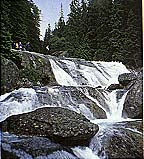
John Keating, in Peter Weir’s “Dead Poets Society,” begins his fateful year at “Hellton” by asking one of his students to, “open your hymnal to page 542 and read the first stanza of the poem you find there.” The student, the unfortunately named Mr. Pitts, reads… “To the Virgins, to Make Much of Time?” Keating replies, “Yes, that's the one. Somewhat appropriate, isn't it?” Pitts goes on with the opening stanza of the poem:
In literature, and in life, we often encounter metaphoric seeds. In the Parable of the Sower, the Lord Jesus used seed as a metaphor for the Word, falling upon various ears.
In a recent post, Matt Jordan expounded on poor Holden Caulfield, who wanted to be a Catcher in the Rye… Holden’s misquote of Robert Burns’ Comin’ thro the Rye. Rye too, is an interesting seed… Apparently it is more tolerant of variable weather than wheat, and thrives in eastern and northern Europe… hardy and with a distinctive taste. Interesting that Burns, and consequently Salinger/Caulfield would choose this particular grain as a setting for meeting and for rescuing children… or perhaps one’s youth.
Matt speaks eloquently of his thoughts at his esteemed grandfather’s passing, and chooses to come close to him in a field on his grandfather’s farm in Virginia… a place where seeds can grow, and a place where one might reclaim fond memories of youth.
This is a season of passings. Many who read this are affiliated with school in one form or another… students, teachers, parents, and May-June is always a time of transition…. coming home from college… leaving home (after the summer) for college, kids coming home, kids being home… a break, a respite, a vacation… the death of the academic year past, the birth of an ephemeral freedom. The rye seed must die and be buried to give new birth as next year’s crop: fields in which the children will grow and flourish. Old, beloved sages pass away, leaving something of themselves for the next generation. That cycle, almost as old as time, sustains us, and offers hope that we can be more.
Keating launches into his famous “Carpe Diem” speech… urging the students to “seize the day” — advice that ultimately is his undoing. But let’s go back to the rosebuds… Symbols of life, youth, and vitality – borne of seeds.Gather ye Rose-buds while ye may,
Old Time is still a flying:
And this same flower that smiles to day,
To morrow will be dying.
In literature, and in life, we often encounter metaphoric seeds. In the Parable of the Sower, the Lord Jesus used seed as a metaphor for the Word, falling upon various ears.
In a recent post, Matt Jordan expounded on poor Holden Caulfield, who wanted to be a Catcher in the Rye… Holden’s misquote of Robert Burns’ Comin’ thro the Rye. Rye too, is an interesting seed… Apparently it is more tolerant of variable weather than wheat, and thrives in eastern and northern Europe… hardy and with a distinctive taste. Interesting that Burns, and consequently Salinger/Caulfield would choose this particular grain as a setting for meeting and for rescuing children… or perhaps one’s youth.
Matt speaks eloquently of his thoughts at his esteemed grandfather’s passing, and chooses to come close to him in a field on his grandfather’s farm in Virginia… a place where seeds can grow, and a place where one might reclaim fond memories of youth.
This is a season of passings. Many who read this are affiliated with school in one form or another… students, teachers, parents, and May-June is always a time of transition…. coming home from college… leaving home (after the summer) for college, kids coming home, kids being home… a break, a respite, a vacation… the death of the academic year past, the birth of an ephemeral freedom. The rye seed must die and be buried to give new birth as next year’s crop: fields in which the children will grow and flourish. Old, beloved sages pass away, leaving something of themselves for the next generation. That cycle, almost as old as time, sustains us, and offers hope that we can be more.




